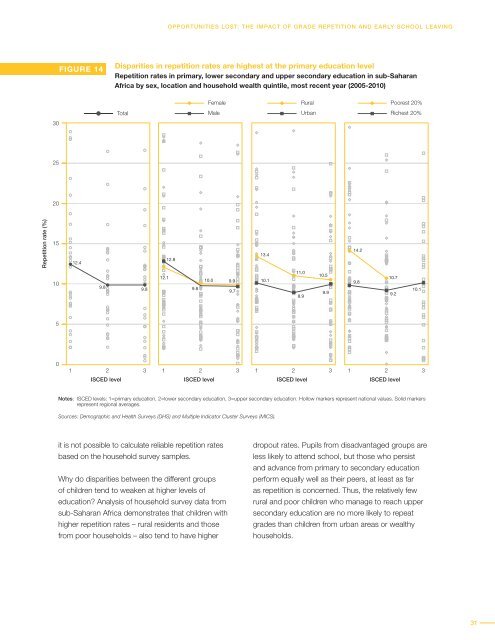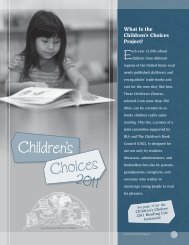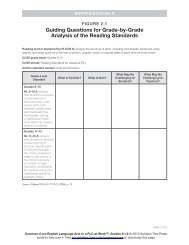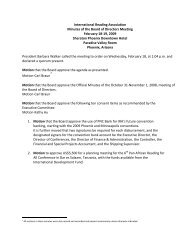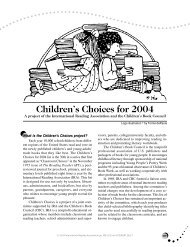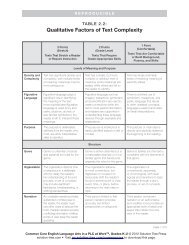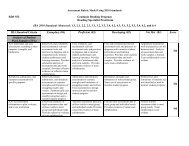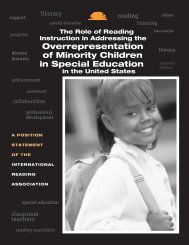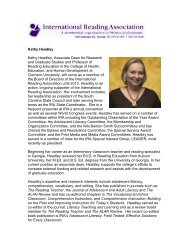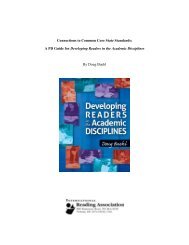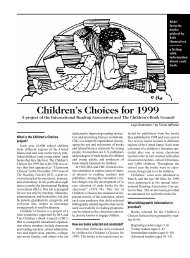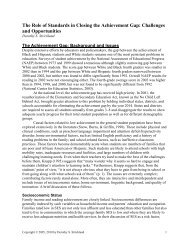Global Education Digest 2012 - International Reading Association
Global Education Digest 2012 - International Reading Association
Global Education Digest 2012 - International Reading Association
Create successful ePaper yourself
Turn your PDF publications into a flip-book with our unique Google optimized e-Paper software.
OPPORTUNITIES LOST: THE IMPACT OF GRADE REPETITION AND EARLY SCHOOL LEAVING<br />
FIGURE 14<br />
Disparities in repetition rates are highest at the primary education level<br />
Repetition rates in primary, lower secondary and upper secondary education in sub-Saharan<br />
Africa by sex, location and household wealth quintile, most recent year (2005-2010)<br />
Female<br />
Rural<br />
Poorest 20%<br />
Total<br />
Male<br />
Urban<br />
Richest 20%<br />
30<br />
25<br />
20<br />
Repetition rate (%)<br />
15<br />
12.4<br />
12.8<br />
13.4<br />
14.2<br />
10<br />
9.8<br />
9.8<br />
12.1<br />
9.8<br />
10.0 9.9<br />
9.7<br />
10.1<br />
11.0<br />
8.9<br />
10.5<br />
9.9<br />
9.8<br />
10.7<br />
9.2<br />
10.1<br />
5<br />
0<br />
1 2 3<br />
1 2 3<br />
1 2 3<br />
1 2 3<br />
ISCED level<br />
ISCED level<br />
ISCED level<br />
ISCED level<br />
Notes: ISCED levels: 1=primary education, 2=lower secondary education, 3=upper secondary education. Hollow markers represent national values. Solid markers<br />
represent regional averages.<br />
Sources: Demographic and Health Surveys (DHS) and Multiple Indicator Cluster Surveys (MICS).<br />
it is not possible to calculate reliable repetition rates<br />
based on the household survey samples.<br />
Why do disparities between the different groups<br />
of children tend to weaken at higher levels of<br />
education? Analysis of household survey data from<br />
sub-Saharan Africa demonstrates that children with<br />
higher repetition rates – rural residents and those<br />
from poor households – also tend to have higher<br />
dropout rates. Pupils from disadvantaged groups are<br />
less likely to attend school, but those who persist<br />
and advance from primary to secondary education<br />
perform equally well as their peers, at least as far<br />
as repetition is concerned. Thus, the relatively few<br />
rural and poor children who manage to reach upper<br />
secondary education are no more likely to repeat<br />
grades than children from urban areas or wealthy<br />
households.<br />
31


